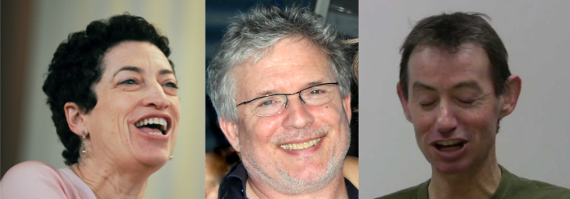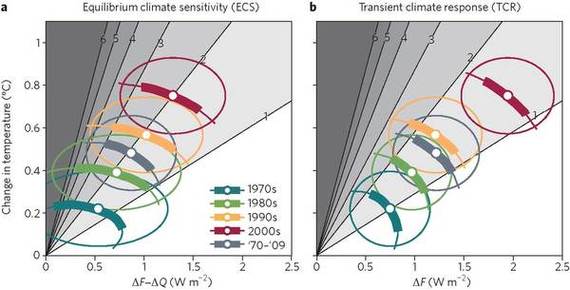 Stefan Lewandowsky's latest paper is out today in the Bulletin of the American Meteorological Society and features none other than Naomi Oreskes as a co-author, with the scientific oomph coming from CSIRO's James Risbey. With a roster of authors like that I think it's fair to say that one knows what to expect.
Stefan Lewandowsky's latest paper is out today in the Bulletin of the American Meteorological Society and features none other than Naomi Oreskes as a co-author, with the scientific oomph coming from CSIRO's James Risbey. With a roster of authors like that I think it's fair to say that one knows what to expect.
The paper is about the pause in surface temperature rises and is an attempt to demonstrate that it doesn't exist. Not very interesting I hear you say. However, the paper is not without its moments of controversy. In particular, this paragraph jumped out at me.
...some researchers (albeit a minority) have taken the “pause” to imply that the climate system may be less sensitive to greenhouse gas emissions than previously thought (Lewis 2013; Otto et al. 2013; Curry 2014; Lewis and Curry 2014).
What is clear from this is that Lewandowsky and Oreskes don't understand the energy budget studies. As Nic Lewis has pointed out before, you would expect climate sensitivity estimates obtained this way to be unaffected by the pause:
In principle, the lack of warming over the last ten to fifteen years shouldn't really affect estimates of climate sensitivity, as a lower global surface temperature should be compensated for by more heat going into the ocean.
What is truly remarkable is that Lewandowsky et al have managed to read all of the four publications they cite without noticing that this stability with respect to the period under consideration is prominently discussed in them. In fact in Otto et al it was pretty much the whole point of the paper. In other words, the papers cited by them say precisely the opposite of what Lewandowky et al says they do. Otto et al had one diagram in it, which showed that you get low climate sensitivity no matter what end period is chosen. Indeed the ECS estimate based on a 2000s end period is higher than the one based on a 1990s end period.
 The stability of the climate sensitivity estimate under different end periods is discussed in Lewis and Curry 2014:
The stability of the climate sensitivity estimate under different end periods is discussed in Lewis and Curry 2014:
[Otto et al.] yielded encouragingly stable estimates for ECS using final periods of 1980-89, 1990-99, 2000-09 and 1970-2009, with medians of 2.0 K when using 2000-09 data and 1.9 K otherwise.
And as for Lewis 2013, well that paper didn't even cover the pause:
We present results using the F06/SFZ08 five decade to 1995/96 surface diagnostic data so as to provide accurate comparisons with the F06 results. We also present results using a revised, extended surface diagnostic with correctly matched model and observational data for the six decades to 2001, using a nine decade climatology to 1991 to compute temperatures anomalies.
Curry 2014, the last of Lewandowsky's citations, is an editorial in the Wall Street Journal, which contains this:
...the estimates in [the] empirical studies are being borne out by the much-discussed “pause” or “hiatus” in global warming—the period since 1998 during which global average surface temperatures have not significantly increased.
Which again is not what Lewandowsky said she is claiming.
I conclude, therefore, that this part of the paper by Lewandowsky, Risbey and Oreskes is a complete fabrication.
 Bishop Hill
Bishop Hill